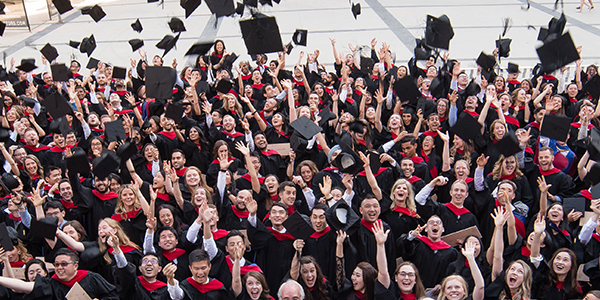How UBC’s province-wide medical program is helping inspire doctors to practise in all corners of B.C.
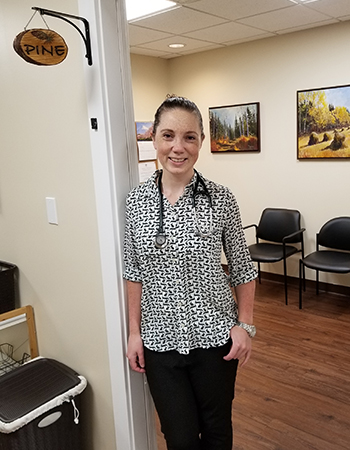
Family doctor Mallory Quinn, a graduate of UBC’s province-wide medical program, at her clinic in Smithers, B.C.
Her conviction grew stronger with every step she planted on the familiar forest floors of Smithers, B.C.
“At that moment, I knew that this was where I was supposed to live and create a life for myself,” says Mallory Quinn, reflecting on her decision to return to her hometown and set up shop as a new family doctor.
It wasn’t long after she moved back to Smithers that Dr. Quinn, a graduate of UBC’s province-wide medical program, teamed up with two other family doctors to open Northern Roots Primary Care, a full-service, community clinic.
“It’s an incredible experience to open a new medical practice that can help support the health care needs of patients and families in my hometown,” she says.
In fact, there’s rarely a day that goes by that Dr. Quinn doesn’t come across a familiar face.
But — as a self-proclaimed small-town girl — she wouldn’t have it any other way.
“I have run into old friends at the clinic and hospital who are now parents and bringing in their own children to have cuts stitched, or an ear infection treated,” she says. “I like knowing my patients’ backgrounds and knowing their stories — to me, it makes a difference to be able to have that kind of connection with people.”
Dr. Quinn’s deep appreciation for smaller, tight-knit communities was one of the reasons she decided to pursue her medical training with UBC’s Northern Medical Program (NMP) in Prince George — one of four unique MD training sites in the province.
“I liked the idea of being in a smaller program, in a smaller location, while still receiving excellent training,” she recalls.
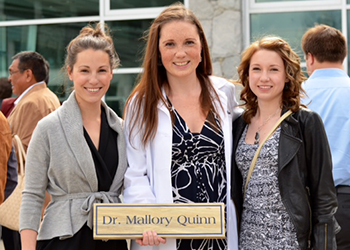
Dr. Quinn graduated from the Northern Medical Program in Prince George.
Over the course of her time in medical school, Dr. Quinn gained countless experience training alongside doctors in a range of rural communities in the North and throughout the rest of B.C. — from Campbell River and Nanaimo to Fernie, Salmon Arm and Cranbrook.
It was this early exposure to rural medicine, she says, that helped inform her decision to return home.
“The program was invaluable. I gained a lot of exposure training in smaller communities and these experiences really opened my eyes to the challenges and benefits of rural medicine,” says Dr. Quinn.
But Dr. Quinn isn’t the only UBC-trained doctor who has been impacted by their training experience in the province-wide program, which takes students far beyond the boundaries of Greater Vancouver to urban, rural and remote communities in the North, Interior and on Vancouver Island.
Making life-long connections
Representing one of the first of its kind in Canada, UBC’s distributed MD program was first created in 2004 in partnership with the University of Northern British Columbia, the University of Victoria, and all of B.C.’s health authorities. In 2011, the program was further expanded to UBC Okanagan in Kelowna.
According to Dr. Dermot Kelleher, Dean of the Faculty of Medicine, this province-wide approach is helping encourage graduates, like Dr. Quinn, to practise in communities where they’re needed most.
“We’re improving the health of British Columbians by giving our medical students the opportunity to train – and make connections – in rural and remote areas.”
Dr. Dermot Kelleher
“We’re improving the health of British Columbians by giving our medical students the opportunity to train – and make connections – in rural and remote areas,” says Dr. Kelleher. “Many factors influence where a doctor decides to practise. But by broadening our students’ horizons, more of them are choosing to practise in communities where doctors have traditionally been scarce.”
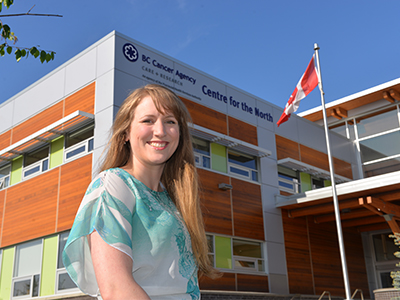
Taya O’Neill-Haugland outside the BC Cancer Agency Centre for the North in Prince George, where she works as a family doctor.
In Prince George, a four-hour drive south east of Smithers, Taya O’Neill-Haugland is keenly aware of the important role she plays — and responsibility she carries — as a family doctor in the North.
After graduating from the NMP in 2015, she remained in Prince George to complete her two-year family medicine residency program with UBC.
“In a lot of ways, being a resident in Prince George was about continuing what I loved about working there as a medical student,” she says.
Today, Dr. O’Neill-Haugland — who is among more than 2,700 doctors who have graduated from UBC’s distributed MD program since 2008 — pursues a variety of roles as a family doctor in Prince George.
Between her work as primary care provider at the Central Interior Native Health Society, an inner-city clinic focused on Indigenous care, and the Health Services Centre at UNBC, Dr. O’Neill-Haugland stays busy helping to provide coverage for other family doctors in the community and serving as a general practitioner in oncology at the BC Cancer Agency Centre for the North.
When asked how she juggles her broad range of family practice interests, she laughs and says, “Well, my car gets a lot of miles.”
Yet Dr. O’Neill-Haugland wouldn’t change a thing because, for her, it is all about the people who make up the community she is part of.
“It’s the people who keep me here, doing this work — the people who trained me, the people I work with, the people I have the opportunity to care for as patients, and honestly the community of Prince George as a whole. As a family doctor, it’s a privilege to be able to spend years getting to know and care for patients, while hopefully making a difference in the community.”
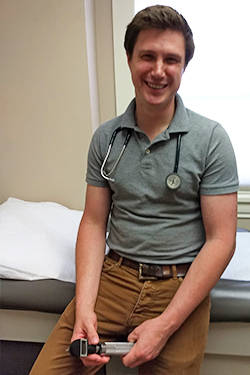
Paul Dickinson is busy building up his own family practice in Kamloops.
Meanwhile, in B.C.’s Interior, Paul Dickinson, another UBC medical graduate who completed his family medicine residency in Kamloops in 2016, echoes Dr. O’Neill-Haugland’s sentiments.
“What I love about family medicine is the opportunity to really be a part of the community and offer continuity of care. Just the other day, a little boy, who I actually delivered when I was a resident, was in my clinic for a checkup,” says Dr. Dickinson, who is now busy building up his own family practice in Kamloops.
Originally from Lillooet, Dr. Dickinson says the decision to stay in the Interior — close to family and with ample access to the great outdoors — was important.
“My wife and I love to hike and there are so many activities here for our children,” says Dr. Dickinson, who now has two young kids of his own.
But above all else, he says it was the welcoming medical community in Kamloops, and the experiences he gained as a trainee in UBC’s province-wide program that encouraged him to set up practice in the region.
“The distributed program is the way to go — it really is keeping doctors in these smaller communities,” says Dr. Dickinson. “Here in Kamloops, there is so much support from the medical community. Even when I was a resident, I felt that I had a place here.”
A growing community of doctors
While there has been a steady rise in the number of graduates, like Dr. Dickinson, who are entering family medicine, the number of UBC-trained specialists has also expanded, helping address specific health care needs in B.C.
Dr. Sara Waters, an anaesthesiologist in Victoria, is one of them.
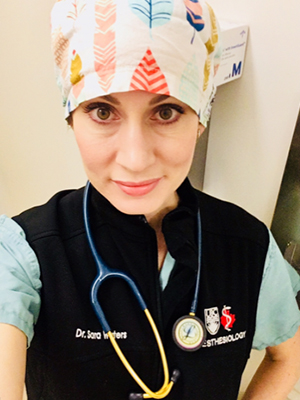
Sara Waters, a graduate of the Island Medical Program, is now working as an anaesthesiologist in Victoria.
Growing up in Victoria, Dr. Waters loved the idea of staying near family and friends while completing medical school. In 2005, she was among the second cohort of students to join UBC’s Island Medical Program.
“Even in its infancy, the program was really well designed and everyone — from the local doctors to the larger community — was invested in seeing it succeed. I really liked how right from the outset they were eager to train physicians to one day recruit and retain.”
After graduating from the program in 2009, Dr. Waters went on to complete her five-year anaesthesiology residency program with UBC. While most of her residency training took place in Vancouver, Dr. Waters often returned to the Island for electives, continuing to strengthen the ties she had formed with the medical community during her time as a student.
“The Island Medical Program gave us so much exposure to how great a medical practice on the Island can be. My experience in the program was definitely a part of drawing me back to Victoria,” says Dr. Waters.
Today, she works among a team of anaesthesiologists at the hospital, where she plays a critical role in keeping patients safe and comfortable before, during and after surgical procedures.
“I think what I love most about my job is the everyday satisfaction of when a patient wakes up and smiles — even if it’s a routine surgery for me, it can be a very stressful time for patients, so it’s my job to ensure they have a pleasant experience, where they are comfortable and their anxieties are eased.”
When she’s not in the operating room, Dr. Waters likes to stay busy, organizing social events for colleagues, volunteering her time and talents during surgical missions abroad, and maintaining bonds with some of her former IMP classmates, who are now working as family doctors and specialists, ranging from ophthalmologists, urologists and psychiatrists, in the region.
“It’s great because we’re still friends and now we get together with our own families,” says Dr. Waters. “There really is a growing community of doctors here.”
This May, nearly 300 more doctors will graduate from UBC’s medical school, marking the 10th anniversary of medical graduates trained in the province-wide program.
Meet the Class of 2018
This week, hundreds of new graduates will gather to celebrate their achievements and look ahead to the next stage of their careers.
